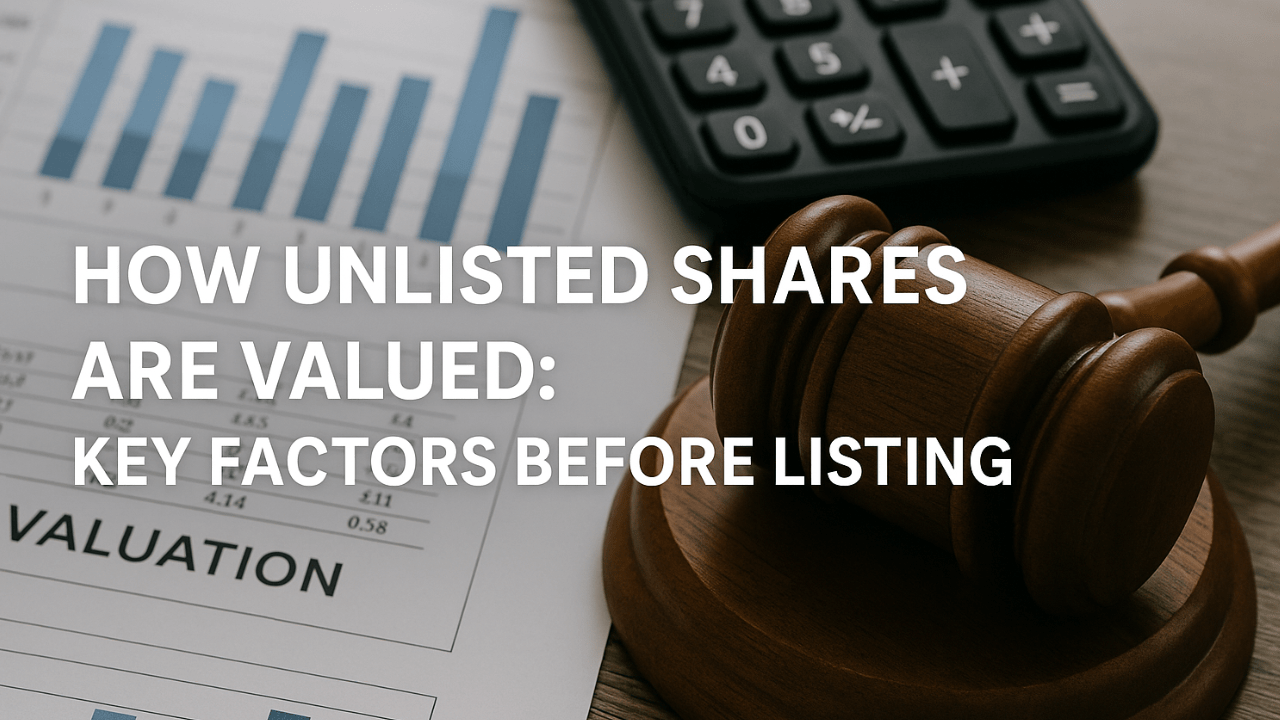In India, unlisted shares provide a window of opportunity to invest in high-potential companies before they go public. Unlisted shares let investors get in on the action, whether for a new startup or a mature business. Since unlisted share prices are not traded on the NSE and BSE, determining their price in the market becomes tricky.
This article will discuss share pricing for Unlisted Shares in India. We will highlight reliable sites, the most important price determinants, and safety price tips offered by experts. If an investor is looking at pre-IPO investing or is a first time investor, the material in this article is meant to assist these customers in making decisions with confidence.
What are Unlisted Shares?
Unlisted shares relate to the equity of companies that have not yet become registered members of any formal stock exchange, such as the NSE or BSE. Such shares can, however, be traded privately through channels like investment dealers, specific trading sites, or even the participants themselves.
In India, the acquisition of unlisted shares has become a trendy form of investment primarily because people are out to target companies in the pre-IPO stage. In the absence of reliable and current price information, unlisted shares become difficult to put a price on, and that is the purpose of this guide.
Significance of Checking Unlisted Share Prices
It is essential for investors to keep themselves updated of unlisted share prices for driving maximum profits in the private market.
Regular updatation with the prices of unlisted shares helps investors in:
- Determining the value of a business before deciding to invest or divest.
- Analyzing demand and sentiment for companies about to go public.
- Identifying the right time for entry and exit so that potential loss can be avoided.
Prices for unlisted shares do not come from public stock exchanges, but rather from private exchanges and negotiations amongst buyers and sellers. Unlisted shares that are competitively priced provide value investors with profitable opportunities.
Step-by-Step Guide to Check Unlisted Share Prices in India
Step 1: Identify Trusted Unlisted Share Platforms
Learn more about trusted platforms where you can begin trading in the unlisted market. Delisted Stocks is one of the trusted sites that provide market prices, company financials, and recent deals.
Step 2: Search for the Company Name
To find the unlisted share price in India of a particular company, type it into the search engine. For example, enter “MSEI Unlisted Share” “HDFC Securities” “Matrix Gas” and “Polymatech Unlisted Share”
This will return the following company info:
– market price range of the recent shares
– price of the latest executed transaction
– market sentiment (whether buyers are more interested or sellers in a transaction)
– company background, including financials.
Step 3: Compare Prices across Multiple Sources
The variability in the prices of unlisted shares of several unlisted securities distinguishes them from their listed counterparts. Therefore, it is best recommended to compare the price offered by a dealer and the price offered on the different platforms to a few (2 or 3) of the trusted sites. Cross-check especially before you commit any resources.
Step 4: Compare Transactions and Trends in the Market
Price analytics dashboards give potential investors an opportunity to assess:
1. Long-term movement trends in price and bottom line for several months.
2. Activity levels and the liquidity of other investors.
3. Demand for the stock and speculation of an upcoming IPO.
Step 5: Assess Financial Performance
When determining if a share will continue to appreciate in value, assess:
1. Annual reporting and/ documentation as a share will be most in a growing company.
2. Documentation associated with sector growth potential and profitability as a company.
3. Positioning of the company relative to competitors in the sector.
When combined, the above will yield the most practical answer.
Step 6: Communicate with Registered Intermediaries/ Dealers
Assuming the price-to-value position has been defended, avoid direct dealings via unregulated social media to protect authentication and deal transparency. Communicate via unremunerated, authored, and compliant deal structures for unlisted share dealing due to counterbalancing liquidity concerns.
Factors Influencing Unlisted Share Prices in India
Unlisted shares can have different prices depending on various different reasons, and understanding these reasons will help investors make more reasonable choices. The reasons are:
- Company performance and evaluation: When a company has consistent and increased revenue growth, relative profitability, and healthy fundamentals, their unlisted shares will become more expensive over time.
- Demand-supply determinants: When there is an increased demand for unlisted shares on the secondary market and a limited supply, they become more expensive.
- Expected IPO: The unlisted share price is likely to increase when there is expected heightened demand for the unlisted share, given anticipation for the company to go public in the near future.
- Regulatory and market changes: The undervalued share prices of a company are likely to increase due to demand when there is a policy change or other relevant reform that improves the entire market or specific sectors.
- Market sentiment and liquidity: An active market for a share and trading of the share tends to push its price higher, and excessively low liquidity or a stagnant market tends to create discounts on prices.
Understanding these factors helps explain why certain unlisted shares are traded at a premium, and other, less desirable, unlisted shares are traded at a discount, enabling the investor to maximize the timing of their investments.
Things You Must Know Before Investing
When it comes to transparency and safeguarding your investments in unlisted shares in India, nothing comes before your peace of mind. Some simple safety measures can go a long way.
- Always Authenticate the Platform or Dealer. Stick to trading with legally recognized dealers. They will provide legal ‘entry’ and ‘exit’ points in the transaction, reducing the risk of faulty shares and leaving one with less to gain from fraud.
- Always Ask for Proof of the Trade. For every transaction, you should obtain and keep documents, i.e., trade confirmations and contract notes, covering the deal so you can prove the contract.
- Don’t make Speculative Investments. Unlisted shares should not be purchased based on the hype of the IPO or the immediate and momentary hype in the market. Research based on the good fundamentals of the company.
- Stay Up to Date on SEBI Guidelines. Regularly check SEBI’s unlisted market environment for the latest compliance orders to make safe and informed decisions.
Taking the above steps provides secure investing in unlisted shares.
Key Takeaways
Important points to remember before investing in unlisted shares.
- Unlisted shares do not trade on the public stock exchanges in India. Unlisted shares have prices set in private negotiations, and in the case of certain unlisted shares, prices are available on unlisted share pricing platforms.
- To get accurate insights regarding the indicators and the current price range, use established platforms and do not use unofficial platforms as sources.
- To minimize the probability of overpaying, it is rational to compare several websites or traders.
- Analyze a company’s fundamentals – revenue, profit, and growth metrics – and their ability to determine fair value and growth potential over time.
Clearing the points mentioned above will provide you with the necessary unreleased references for unlisted share prices in India and assist you in making informed investment decisions.
FAQs
Q1-How does one determine the value of unlisted shares in India?
Determining the value of unlisted shares in India depends on recent transaction volumes, the fundamentals of the company, and prevailing market demand. Pricing also hinges on sentiment in negotiated private equity markets, since uncatalogued shares do not sell on stock exchanges.
Q2-What is the evaluation methodology for unlisted shares valuation?
Established valuation methodologies depend on point estimates from the market providers, and historically transacted values remain estimates, not firm valuation conclusions. Valuation analyses for unlisted shares are anchored on disparate estimates to gauge price rationality and calibrated toward the Indian market.
Q3-Can one directly acquires unlisted shares?
Indirectly, unlisted market participants do come to the market. Intermediaries in the unlisted market and market participants via authorized dealers. This is to say that ‘social sellers’ and unregistered brokers must be avoided.
Q4-Do unlisted shares have daily price changes?
In India, unlisted shares do not operate like listed shares. Unlisted shares do not have daily price changes. For unlisted shares, price changes occur only after a transaction, which may depend on secondary market activity, or on a weekly or monthly basis, based on the interest of investors.
Q5-Where to find the latest unlisted share prices in India ?
Unlisted share prices can be viewed on reputable websites like Delisted Stocks. Current market rates are provided along with company and investor analyses.
Disclaimer
This article is for informational purposes only and should not be considered investment advice. Prices and data of unlisted shares are based on publicly available sources and may vary. Investors are advised to conduct independent research or consult financial professionals before making investment decisions.









